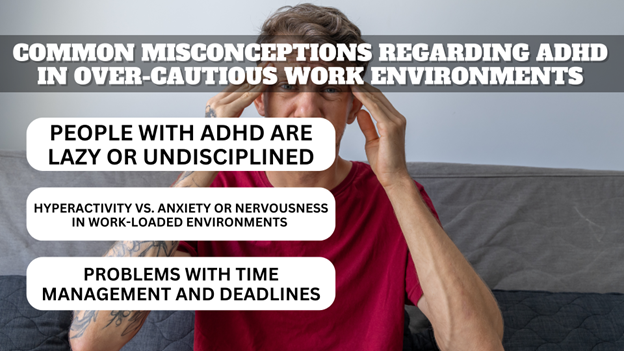Why Hyperactivity Disorder is Often Misunderstood in High-Stress Jobs
Hyperactivity disorder also referred to as ADHD-Attention Deficit Hyperactivity Disorder, is often misconceived as a condition confined only to children. However, that is not the case. It also appears in adults to include professionals in the high-stress job category. High-pressure work settings require much attention, quick decisions, and complete concentration.
In such a context, ADHD will surface in various ways that people in those high-stress jobs will mistake or misinterpret. This misunderstanding usually gives way to myths and stereotypes against people with ADHD, causing much damage to their career growth and professional relationships.
Characteristics of Hyperactivity Disorder
ADHD is a neurodevelopmental disorder characterized by a failure in attention, impulse control, and executive functioning. The subtypes of ADHD are divided into three categories: inattentive, hyperactive-impulsive, and combined. Codes for ADHD in ICD-10 help classify these subtypes and assist in diagnosis. Adults with ADHD are diagnosed with difficulties focusing restlessness, impulsivity, and increased vulnerability to stress.
These traits can appear exaggerated in high-stress jobs because of the nature of the work. But ADHD isn’t a lack of attention and hyperactivity alone. Many individuals with ADHD are also creative problem solvers, multitaskers, and outsiders who think “out of the box.”
In the right workplace, under the right support, they will come up with innovative solutions and bring much energy into a company.
Common Misconceptions Regarding ADHD in Over-Cautious Work Environments

People with ADHD Are Lazy Or Undisciplined
Perhaps the most heinous misconception about ADHD in high-stress jobs is that the sufferer is lazy or lacks discipline. Such ideas are commonly fueled by their inability to organize the tasks at hand, their problem in prioritizing responsibilities, or even in meeting deadlines; however this has little if any connection to work ethic or motivation.
Many ADHD people are quite goal-oriented and more driven than most other personalities. It’s a way that the brain processes information, making it all but impossible for them to execute traditional task-management strategies. Linked attention-shift patterns may also be misunderstood, as is the case with ADHD.
For instance, a person with ADHD was heavily focused on one task, completely ignoring the rest. The outcome was such that people thought that this person was only interested in other dimensions of their work. This sets them in conflict with colleagues and bosses who might perceive the same as avoidance of work or intentional slacking.
Hyperactivity vs. Anxiety or Nervousness in Work-Loaded Environments
Because the work environment is always considered stressful, certain forms of hyperactivity may be wrongly identified as the symptoms of anxiety or nervousness. Individuals with ADHD are restless and display a form of incessant motion-restlessness inactivity: they cannot keep sitting down. It may be confused with being unable to cope with stress at work.
The mates wrongly assume that the person cannot keep up with pressure or fail to cope with such a situation when, in reality, the actual reason is the presence of ADHD. In addition, it is stress resulting from overstimulation that an employee with ADHD may experience; for example, chronic office noise and challenging multitasking demands may overwhelm them.
For this reason, unfruitful feedback from managers is likely to occur if these symptoms are not interpreted in the right way; reducing the stresses suggested without healing the root cause: ADHD.
Problems with Time Management and Deadlines
A high-pressure job requires good time management and adherence to deadlines-a skill that is often found missing in adult ADHD. This situation might be equated with irresponsibility and a lack of commitment at work.
However, to people with ADHD, time is viewed very differently; this feature has been defined as “time blindness,” where they are unable to estimate the duration that such a task might consume or prioritize the right exercise.
In high-pressure situations with heavy workloads and tough deadlines, frustration might spring from supervisors or peers who do not grasp the underlying issues that an ADHD individual is up against.
A person may delay everything until the last minute, not through laziness but because they miscalculated their time. Being uninformed on how the human brain perceives time in a person suffering from ADHD, one judges. One cannot overstate the role of stress in the appearance of ADHD symptoms.
The inherent nature of a stressful environment naturally worsens symptoms such as forgetfulness, disorganization, and impulsivity, since most people’s ability to concentrate, retain information, or manipulate multiple tasks is easily disintegrated by stress.
In high-stress jobs, such as finance, healthcare, law enforcement, or technology, involving constant multitasking and quick decision-making, people with ADHD will more easily become overwhelmed. This can lead to burnout if such support or accommodations are not present in the workplace.
Their reviews, promotions, and even retention on the job may be negatively impacted by the condition if their superiors do not understand it.
Advantages of ADHD in High-Stress Jobs
There is much more that focuses on the disadvantageous side of high-stress jobs for people diagnosed with ADHD. However, those strengths associated with the disorder are oftentimes overlooked. Many of those with ADHD have become natural problem solvers, creative thinkers, and very energetic contributors.
Hyperfocusing, when done right, lets them totally become absorbed in a project and produce top work.Most people diagnosed with ADHD work best under pressure because they can move from one activity to another, shift focus and perspective easily, and meet new challenges quickly.
This stimulating of the brain leads them to thrive on complex and shifting situations that overwhelm others. People with ADHD can become high performers in jobs that require creative thinking and adaptability.
How Companies Can Support Employees with ADHD
There are few things in high-stress jobs so important as to understand and make accommodations for employees who may have ADHD. Companies can take several approaches to help someone manage his or her symptoms and be successful in the role:
- Flexible work arrangements: Allowing employees with ADHD to work remotely or have flexible hours can reduce distractions and give them more control over their surroundings, which can help them better focus and be productive.
- Tools for Task Management: Offering access to tools and apps such as task management may be helpful to the ADHD individual because it allows them to be more organized in their activities and better manage their time. These tools can include a calendar, reminders, and a project management platform that breaks down tasks into smaller steps.
- Clear Communication and Deadlines: Employers should provide clear instructions and deadlines for tasks. Setting specific, short-term goals and regularly checking in on progress can help prevent overwhelm and ensure that individuals with ADHD stay on track.
- Offering Accommodations: Employers can offer accommodations, such as noise-canceling headphones, quiet workspaces, or the option to take short breaks throughout the day. These accommodations can help minimize distractions and improve focus.
- Awareness and Education: Employers have to invest in educating their staff about ADHD and other neurodevelopmental disorders so that stigma and misperceptions are reduced. An open and supportive work culture would make a lot of difference for employees with ADHD.
Conclusion
ADHD in high-stress occupations is wrongly perceived, and this leads to wrongful identification that hurts an individual’s career and well-being. By providing the right support and understanding, people with ADHD can succeed in fast-paced, demanding work environments.
Tapping into unique strengths that individuals with ADHD bring to the table that includes creativity, problem-solving, and adaptability-more employers can promote a supportive workplace culture and implement workplace accommodations.
In the end, supporting neurodiversity at work is advantageous both to the employee and the employer, thereby turning an otherwise poor work environment into a more inclusive and productive one.
FAQs
- What is the difference between ADHD and anxiety in stressful jobs?
ADHD and anxiety may exhibit many overlapping symptoms, such as restlessness, but ADHD includes symptoms of poor attention, lack of control over impulses, and excessive activity, whereas anxiety arises from excessive worry about stressors.
- How can an individual with ADHD manage deadlines in high-stress jobs?
People with ADHD can better manage deadlines in high-stress jobs using proper tools for task management, developing short-term concise goals, and engaging in collaboration with supervisors to enforce clear deadlines.
- Can people with ADHD succeed in high-stress jobs?
Thus, people with ADHD can indeed do very well in stressful occupations, especially in those that are highly demanding and incorporate creative problem-solving, multitasking, and a gamut of other skills, only if they receive proper support and accommodations.




